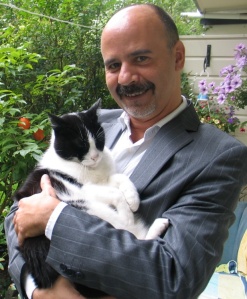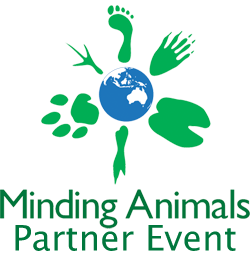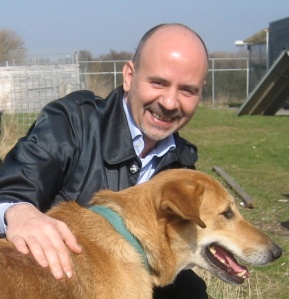This Fall I will be giving multiple lectures and courses for various institutes and organizations. Below you will find an overview of them, with a description of the subject and the practical information on how to register for them. This list is not complete yet, as I am still in contact with other organizations. For the most up to date listing of my lectures and courses you can always check the Calendar page of this blog.
Lecture on theme-day Emotions in cats
On Saturday 29 September the CatBehaviourAdvisorybureau (KattenGedragsAdviesbureau) is organizing a Catday in Amstelveen. The theme of this day is Emotions in cats. Cat behaviour therapist Marcellina Stolting will speak a.o. about traumas and frustration in cats, the relation between cat and ‘owner’ and the influence of play on that relationship, and the role of pheromones in the emotions of cats. Connecting to the subject of this day, I will give a lecture about affection and friendship between animals who belong to two different animal species.

Me being affectionate with dog Umai
Description: The title of my lecture will be Affection across the species barrier (Affectie over de soortgrens heen). The relationship between humans and cats is a good example of the deep bond that can exist between members of two different animal species. Let alone the multitude of other animals, such as dogs, horses and rodents with which humans can build op a good bond. Besides this, there also exist many intriguing cases of affection and special friendships between two different nonhuman animals. Nonhuman great apes can be thrilled by cats and dogs, an elephant and a sheep in a sanctuary who are inseparable and there is a pitbull dog who protects chicks and relates to them lovingly. Even between natural enemies a bond can sometimes exist. An example is a lioness who treated a young antelope as if he were her child. The remarkable aspect of these relationships is that to feel affection for someone it doesn’t seem to matter to what species you belong. A lesson in love we could all use as an example. The cases of interspecific affection often involve animals in human captivity, such as zoos and sanctuaries, or when humans have animals of various species inside their homes. But also in the wild do we sometimes see fascinating examples of affection between different species, like in the play between chimpanzees and baboons. In my lecture I will discuss the possible causes for the existence of these affections and friendships. Are the animals still young and do they maybe see another animal as a substitute parent? What is the neurochemistry of affection (brain opioids and hormones like oxytocin) and does that exist in nonhuman animals as well? Does empathy, the ability to take the perspective of another, also play a role? I will show some interesting and fun short films during the lecture.
Practical information: Cat day KattenGedragsAdviesbureau. Saturday 29 september, from 09.00 to 18.00. All lectures will be in Dutch. Location: Alleman, Den Bloeyenden Wijngaert 1, 1183 JM Amstelveen. Registration fee: 75 euro. To register: click here.
2 Lectures on international seminar at Foundation AAP
On Monday 1 and Tuesday 2 October AnimalConcepts and Foundation AAP will present the seminar Animal Welfare: Emotion, Cognition and Behaviour. Besides myself there will be 3 other speakers: The British/American ethologist Jonathan Balcombe, Department Chair for Animal Studies of the Humane Society University in Washington D.C. and author of multiple books among which the great book Pleasurable Kingdom: Animals and the Nature of Feeling Good. He will give 3 lectures, one about the subject of the book I just mentioned, “The Inner Lives of Animals,” and “Think or Swim: The Inner Lives of Fishes.” Psychologist Charlotte Post will present the lecture “Useful functions of anthropomorphism.” Finally, psychologist Sabrina Brando, owner of AnimalConcepts, will give the lecture “Perception & Words.” A guided tour of the Foundation AAP animal sanctuary is also part of the programme and each day will end with a panel discussion.
Description: The two lectures that I will give are the following. In “Language research with nonhuman animals” I will give a review of the results of all language studies with nonhuman animals, which already take place for more than a century now. I will present the spoken language experiments with great apes, the sign language studies with great apes (including my own research), the projects in which bonobos and chimpanzees communicate with lexigrams (arbritrary symbols), the studies with dolphins and sealions on their understanding of commands given by human gestures, the work with the grey parrot Alex and his ability to speak human words and to use these to describe objects and finally the recent language research with dogs: border collie dogs who can understand hundreds of human words for objects and the Brazilian dog Sofia who uses lexigrams to indicate what she wants. The second lecture that I will give is “Linguistic humans vs. nonlinguistic animals: A moral divide?” and will tackle the question whether the capacity for language is of relevance to our ethics toward nonhuman animals. The theories of the philosophers R.G. Frey and Peter Carruthers about language and ethics will be discussed, as well as the way in which the Great Ape Project has used the results of language research with great apes in its moral argumentation. I will argue that the presence or absence of language and other cognitive abilities should not have moral consequences and by a discussion of Gary Francione’s work I will show that the capacity for sentience or (phenomenal) consciousness is a sufficient condition for moral equality among animals.
Practical information: Seminar Animal Welfare: Emotion, Cognition and Behaviour. Monday 1 and Tuesday 2 October, from 09.00 to 17.00. Location: Stichting AAP, Almere. Registration fee: 125 euro, for students 95 euro. The whole seminar will be given in English. Registration: AnimalConcepts website.
Lecture for The tower of Babel course, Hovo Groningen
From October 11 to November 22 the Higher Education for Older People (Hoger Onderwijs Voor Ouderen – Hovo) Groningen is organizing the course The tower of Babel – Language, communication and culture. It will consist of lectures by multiple speakers who will discuss all kinds of subjects regarding language and its origins.
Description: On Thursday 18 October I will give the lecture “Language in animals? Communication and language research with animals.” Contents: The question whether other animals than humans have language is being studied by closer examination of the natural communication of nonhuman animals and language research with these animals. Studies of the various alarm calls of vervet monkeys and prairie dogs show that the capacity for reference exists in animal communication. Birdsong, like human language, is learned and contains a phonological form of syntax. Language research with great apes has shown that the apes are able to understand symbols, but that they don’t combine these meaningfully and predominantly use them to acquire things from humans. Recent research with border collie dogs confirms that they can understand hundreds of human words. Especially the presence of grammar and syntax distinguishes human language from animal communication.
Practical information: HOVO Groningen. Thursday 18 October, from 15.30 to 16.30. To attend this lecture, you need to register for the whole course. Registration is open for people of 50 years and older. All lectures are given in Dutch. Registration fee: 145 euro. Registration: website of the Seniorenacademie Hovo Groningen.
Communication and language in animals course Hovo Brabant
From October 26 to November 30 I will give a course of 6 lectures called Communication and Language in Animals for the Higher Education for Older People (Hovo) Brabant, location Eindhoven. For this course too, only people of 50 years or older can register.
Description: In the first lesson we will discuss the definitions and characteristics of communication and human language. We will look at animal communication and ask the question whether animals only communicate their passions and emotions, or whether they can also refer to things and situations in the outside world. The second class will be about the calls and songs of birds. In what way do the songs of songbirds, parrots and hummingbirds share similarities with human language? The songs of humpback whales will also be presented. The third lesson will be about the natural communication of great apes (facial expressions, vocalisations and gestures). The fourth lesson will present the language research carried out with great apes. Attempts to teach chimpanzees and other apes spoken words and signs will be discussed. In the fifth lesson my own research with signing chimpanzees will be presented and we will discuss the work with the bonobo Kanzi and his use of geometric symbols or lexigrams. In the last lesson the language research with dolphins, sealions, parrots and dogs will be discussed. The parrot Alex and his use of human words will be presented, as well as the recent studies with border collie dogs, who appear to understand hundreds of human words for toys.
Practical information: Hovo Brabant, location Eindhoven. Friday afternoons, from 13.00 to 14.45. The dates of the course: 26 October, and 2, 9, 16, 23, and 30 November 2012. Registration fee: 151 euro. To register for this course, go to the website of HOVO Brabant.
3 lecture evenings at Healthcare-Academy Den Hoek
In November I will give three lectures on a Thursday evening at the educational institute of Eric Laarakker, the Healthcare-Academy Den Hoek in De Bilt.
Description: First lecture: On Thursday November 1 I will give the lecture Recent research on the intelligence of dogs, cats, and horses. I will discuss the recent scientific studies on the intelligence or cognition of these animals. In the past 18 years many new and exciting studies on this subject have been carried out at the universities of Leipzig, Budapest and all over the world. Subjects that I will present are a.o.: communication and language research, knowledge about the physical world (object permanence, counting, understanding of gravity) and social intelligence: understanding of what humans see, hear and know, learning through observation, understanding of human communicative signals, and empathy. The emphasis of the lecture will be on dogs, given that most recent studies are carried out with dogs.
Second lecture: Thursday November 15: Consciousness and emotions in animals. In this lecture I will address the question whether other animals have the ability to experience things like pain and pleasure. Are animals robots without subjective experiences or do animals experience sensations and other things in a phenomenally conscious way? The French philosopher René Descartes claimed that nonhuman animals could not be conscious. Behaviorism in psychology also led to a taboo on the subject of consciousness in general. Even today there are still scholars who do not ascribe consciousness to animals, often based on the absence of ‘higher’ cognitive abilities and language (Bermond, Carruthers). In contrast are positions that argue for the presence of consciousness in animals by argueing from analogy, using systematic analyses of the nervous systems and behaviours of animals. I will also discuss the various emotions of animals. What emotions do they have? Which animals seem to mourn deceased conspecifics? And what has come out of research on empathy in animals?
Third lecture: Thursday November 29: Introduction to animal ethics. In this lecture I will give a review of the most important schools of thought in animal ethics. After a short introduction to philosophy and ethics and the history of moral thought about nonhuman animals, the most important current philosophers will be presented: Peter Singer and his utilitarian ethics of animal liberation. Tom Regan, who argues for animal rights from a deontological perspective. Philosophers who argue that the presence of sentience or consciousness is sufficient condition for moral consideration, such as Gary Francione. Philosophers who make a moral distinction between humans and other animals based on the capacity for language (Frey, Carruthers). Feminist animal ethics which looks at animals with the concepts of care and dialogue. And finally, deep ecology, in which humans and other animals are part of the biosphere.
Practical information: Healthcare-Academy Den Hoek. Thursday 1, 15 en 29 November, from 19.30 tot 22.30. All lectures will be in Dutch. Location: Bisschopsweg 2, 3732 HW De Bilt. Registration fee: 45 euro for each lecture. Registration for all three lectures will get you a discount of 15 euro. Registration through the website of Healthcare-Academy Den Hoek.
Lecture on symposium on consciousness and emotions in animals
On Saturday November 24 the Studygroup of Complementary working Veterinarians (Studiegroep Complementair werkende Dierenartsen) in cooperation with the Royal Dutch Society for Veterinary Science (Koninklijke Nederlandse Maatschappij voor Diergeneeskunde) will organize the symposium Animals in 3D: consciousness, emotions and language in animals (Dieren in 3D: bewustzijn, emoties en taal bij dieren). Besides myself several of the other speakers are: Maarten Frankenhuis “Love dissected” and Frauke Ohl “Emotions and consciousness in rats and mice.”
Description: My contribution has as its title Humans are not the only animals with consciousness (Mensen zijn niet de enige dieren met bewustzijn). In this lecture I will address the question whether other animals have the ability to experience things like pain and pleasure. Are animals robots without subjective experiences or do animals experience sensations and other things in a phenomenally conscious way? The French philosopher René Descartes claimed that nonhuman animals could not be conscious. Behaviorism in psychology also led to a taboo on the subject of consciousness in general. Even today there are still scholars who do not ascribe consciousness to animals, often based on the absence of ‘higher’ cognitive abilities and language (Bermond, Carruthers). In contrast are positions that argue for the presence of consciousness in animals by argueing from analogy, using systematic analyses of the nervous systems and behaviours of animals.
Practical information: Symposium Dieren in 3D: bewustzijn, emoties en taal bij dieren, organized by the SCwD and the KNMvD. Saturday 24 November, from 08.50 to 17.00. Location: Androclus building, Diergeneeskunde, Utrecht University. Registration fee: 45 euro. All lectures are in Dutch. Register through the website of the Royal Dutch Society for Veterinary Science.
Lecture on Langauge research with animals in Wageningen
On December 11 I will give a lecture about language research with nonhuman animals for the People’s University in Wageningen and students of Schoolcommunity Pantarijn. The lecture is open to anyone interested.
Description: Scientists have studied all kinds of animals to see what they can learn of the human language. Great apes can use signs or geometric symbols to communicate with humans. Dolphins and sealions can carry out commands that humans give them in the form of gestures. The parrot Alex can name all kinds of objects by using human words. And border collie dogs can understand hundreds of words for toys and other objects. In this lecture a review is given of the results of these language studies and an answer will be given to the question whether humans are the only creatures with language.
Practical information: Tuesday December 11, from 16.00 to 18.00. Location: Scholengemeenschap Pantarijn, Hollandseweg 7-9 te Wageningen. Registration fee: 12 euro. Registration: click here.
























